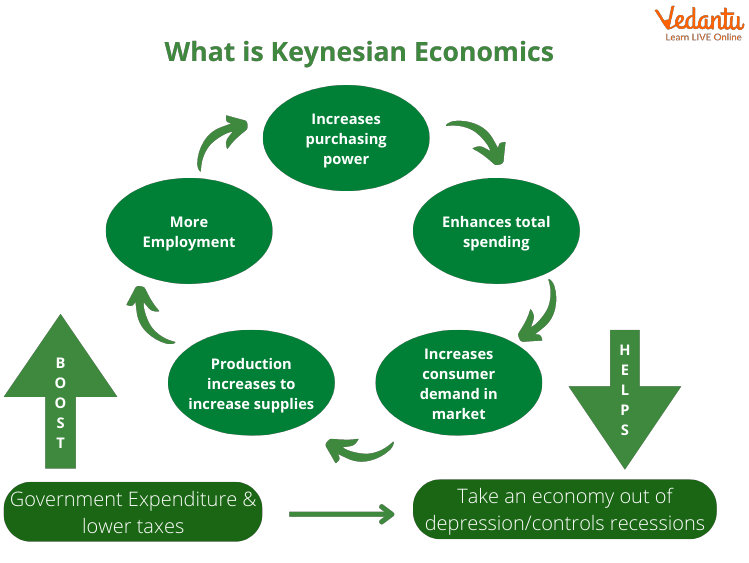




Keynesian Theory of Employment
It is also referred to as the effective demand theory of employment. Keynes developed this first systematic theory of employment. The Keynesian theory of employment states that the cause of unemployment is the deficiency of effective demand, and unemployment can be removed by raising effective demand. With the increase in effective demand, the production in the economy goes up. The increased production generates more jobs thus increasing the employment and giving a boost to the nation’s economy. With the increase in effective demand, there is also an increase in inflation which is good for the economy if controlled within a limit. Therefore, Keynesian theory of employment has a very positive looking approach for the economy of a nation. It helps in dealing with the situations of economic crisis like the Great Depression and the recession.
Keynes Effect
The principle of effective demand is the foundation of Keynes' General Theory of Employment. Employment is dependent upon effective demand and is directly proportional to Effective Demand. As Effective Demand increases, employment and output and real income increase.
Introduction to Keynesian Theory of Employment
This theory deals with all levels of employment that is full employment, widespread unemployment or intermediate level. Keynesian theory is a short-run theory. Keynes strongly believed in government intervention. He did not support the policy of Laissez Faire. In his theory of employment, money is important in determining employment.
Keynesian Economics: Demand Side Driven Theory
British Economist John Maynard Keynes, during the 1930s, developed Keynesian Economics to understand the Great Depression. This Economics is a demand-side driven theory and is based on the belief that with the help of government intervention, a nation's economy can be stabilised. The main focus of this economics is centred around government intervention to manage aggregate demand to prevent situations like recession and depression. This theory believes that when aggregate demand is increased through government policy intervention, the performance of any economy can be optimised. Keynesian economics is based on the belief that aggregate demand and aggregate supply are governed by effective demand. Employment and income depend on effective demand.
Some of the features of Keynesian Economics are:
Aggregate demand and aggregate supply governs the effective demand.
The aggregate supply does not change in the short run so Keynes focussed on the aggregate demand.
Keynesian economists believe that employment and income are dependent on effective demand.
The supply of money and the demand for money determines the rate of interest in an economy.

Keynesian Economics
Keynesian Economics
Keynes developed this theory to deal with the situation of the Great Depression. Keynesian Economists recommend fiscal and monetary policy as the primary tools to manage the economy and fight the menace of unemployment. Keynes's fiscal stimulus theory states that when the government spends money, it leads to an increase in business activity which generates more income and thus increases the GDP. The growth in GDP can be greater than the stimulus amount spent by the government initially. Keynesian Economists believe in saving less and spending more principle so that full employment and economic growth goes on.
Summary
Keynesian Economics is also sometimes known as Depression Economics. Keynesian Economics recommends a demand-side solution to deal with recessions. The intervention of the government forms an important part of Keynesian Theory. Keynes developed the Keynesian Theory of Employment in his book “The General Theory of Employment, Interest, Money” (1936). Monetarism is a branch of Keynesian Economics, and it advocates the use of Monetary Policy over Fiscal policy to deal with various economical problems. Keynesian theory of employment has the following policy implications:
Reform of Capitalism
Government Intervention
Monetary Policy Non – Reliability
Public Works Programme
Full Employment























